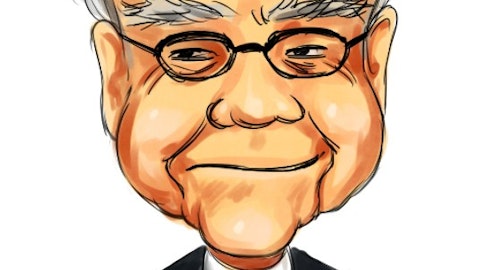Networking giant Cisco Systems, Inc. (NASDAQ:CSCO) is down 1% this year despite a rising market, and some investors are beginning to look at it as a potential value stock. In the company’s most recent fiscal year, which ended in July 2012, revenue was up by 7% over the previous fiscal year. This contributed to a four-year CAGR of 4% with respect to sales, so Cisco appears to have found sustainable low growth. Margins have come down a bit since 2008; net income was about the same figure as it was four years ago, though an increase of 24% over last year. In addition, the company has been relentless at buying back stock: earnings per share last year were $1.49, as opposed to $1.31 in the fiscal year ending in July 2008 when net income was about the same. Revenue and income were up in the fourth quarter of the fiscal year as well as for the year as a whole.
Cisco Systems, Inc. now trades at 12 times trailing earnings given its market capitalization of about $100 billion. Considering that the company is a market leader which pays a 3.0% dividend yield and has been experiencing growth recently, we think that multiple is too low. Wall Street analysts expect $1.95 in earnings per share during the current fiscal year, meaning that the stock is trading at a current-year P/E of 9 assuming their projections prove correct, and then continued growth over the next few years. Even if Cisco holds its business steady, underperforming analyst expectations, it will probably still prove too cheap at the current market price.
Cisco Systems, Inc. made our list of the ten most popular tech stocks among hedge funds for the second quarter for the year (see the full list), though its ownership did decrease. Sandy Nairn’s Edinburgh Partners cut its stake by 12%; however, it still owned 14.2 million shares at the end of June, which made it the fund’s second largest 13F position by market value. Find more top stocks from Edinburgh Partners. Billionaire Ken Fisher’s Fisher Asset Management took a different tack from many of the funds we track, with its shares of Cisco swelling to 21.3 million (research more stock picks from Fisher Asset Management).
Cisco Systems, Inc. made our list of the ten most popular tech stocks among hedge funds for the second quarter for the year (see the full list), though its ownership did decrease. Sandy Nairn’s Edinburgh Partners cut its stake by 12%; however, it still owned 14.2 million shares at the end of June, which made it the fund’s second largest 13F position by market value. Find more top stocks from Edinburgh Partners. Billionaire Ken Fisher’s Fisher Asset Management took a different tack from many of the funds we track, with its shares of Cisco swelling to 21.3 million (research more stock picks from Fisher Asset Management).
We would compare Cisco to Alcatel Lucent SA (NYSE:ALU), Juniper Networks, Inc. (NYSE:JNPR), Riverbed Technology, Inc. (NASDAQ:RVBD), and Palo Alto Networks Inc (NYSE:PANW). All four of these companies, even though they are much smaller than Cisco in terms of market capitalization, trade at a premium to the larger company on a forward earnings basis. The smallest forward P/E of these four peers belongs to Alactel Lucent, at 12. Alcatel Lucent has fallen by about two-thirds over the last year and its revenue has been in decline. We would be wary of investing in the troubled company.
That leaves the other three peers, which carry even higher forward P/E multiples. Palo Alto Networks IPOd last July and its $4.2 market cap suggests that the market is quite bullish on the company. It did grow its revenue by 88% in its most recent quarter compared to a year earlier, but its earnings next year are expected to be fairly low. Riverbed and Juniper have forward P/Es in the teens, and in both cases these are substantial declines from the large multiples they carry on their trailing earnings. Earning at both companies were down about half last quarter from the same period in 2011, however, and so we are a bit skeptical that they will achieve the ambitious growth targets that the sell-side has set. We certainly wouldn’t recommend them over Cisco either.
Most networking-oriented companies trade at fairly high earnings multiples, yet Cisco is an exception. It actually looks like a good value at current prices, and has delivered a fair amount of growth recently as well.





